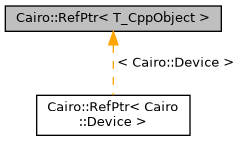|
| | RefPtr () noexcept |
| | Default constructor. More...
|
| |
| | ~RefPtr () noexcept |
| | Destructor - decrements reference count. More...
|
| |
| | RefPtr (T_CppObject * pCppObject) noexcept |
| | For use only in the internal implementation of cairomm, gtkmm, etc. More...
|
| |
| | RefPtr (T_CppObject * pCppObject, int * refcount) noexcept |
| | For use only in the internal implementation of sharedptr. More...
|
| |
| | RefPtr (RefPtr && src) noexcept |
| | Move constructor. More...
|
| |
| template<class T_CastFrom > |
| | RefPtr (RefPtr< T_CastFrom > && src) noexcept |
| | Move constructor (from different, but castable type). More...
|
| |
| | RefPtr (const RefPtr< T_CppObject > & src) noexcept |
| | Copy constructor. More...
|
| |
| template<class T_CastFrom > |
| | RefPtr (const RefPtr< T_CastFrom > & src) noexcept |
| | Copy constructor (from different, but castable type). More...
|
| |
| void | swap (RefPtr< T_CppObject > & other) noexcept |
| | Swap the contents of two RefPtr<>. More...
|
| |
| RefPtr< T_CppObject > & | operator= (const RefPtr< T_CppObject > & src) noexcept |
| | Copy from another RefPtr: More...
|
| |
| template<class T_CastFrom > |
| RefPtr< T_CppObject > & | operator= (const RefPtr< T_CastFrom > & src) noexcept |
| | Copy from different, but castable type). More...
|
| |
| RefPtr & | operator= (RefPtr && src) noexcept |
| | Move assignment operator: More...
|
| |
| template<class T_CastFrom > |
| RefPtr & | operator= (RefPtr< T_CastFrom > && src) noexcept |
| | Move assignment operator (from different, but castable type): More...
|
| |
| bool | operator== (const RefPtr< T_CppObject > & src) const noexcept |
| | Tests whether the RefPtr<> point to the same underlying instance. More...
|
| |
| bool | operator!= (const RefPtr< T_CppObject > & src) const noexcept |
| | See operator==(). More...
|
| |
| T_CppObject * | operator-> () const noexcept |
| | Dereferencing. More...
|
| |
| | operator bool () const noexcept |
| | Test whether the RefPtr<> points to any underlying instance. More...
|
| |
| void | clear () noexcept |
| | Set underlying instance to 0, decrementing reference count of existing instance appropriately. More...
|
| |
template<class T_CppObject>
class Cairo::RefPtr< T_CppObject >
RefPtr<> is a reference-counting shared smartpointer.
Reference counting means that a shared reference count is incremented each time a RefPtr is copied, and decremented each time a RefPtr is destroyed, for instance when it leaves its scope. When the reference count reaches zero, the contained object is deleted
cairomm uses RefPtr so that you don't need to remember to delete the object explicitly, or know when a method expects you to delete the object that it returns, and to prevent any need to manually reference and unreference() cairo objects.
- Examples
- user-font.cc.
template <class T_CppObject >
For use only in the internal implementation of cairomm, gtkmm, etc.
This takes ownership of pCppObject, so it will be deleted when the last RefPtr is deleted, for instance when it goes out of scope.
This assumes that pCppObject already has a starting reference for its underlying cairo object, so that destruction of @pCppObject will cause a corresponding unreference of its underlying cairo object. For instance, a cairo_*_create() function usually provides a starting reference, but a cairo_*_get_*() function requires the caller to manually reference the returned object. In this case, you should call reference() on pCppObject before passing it to this constructor.
